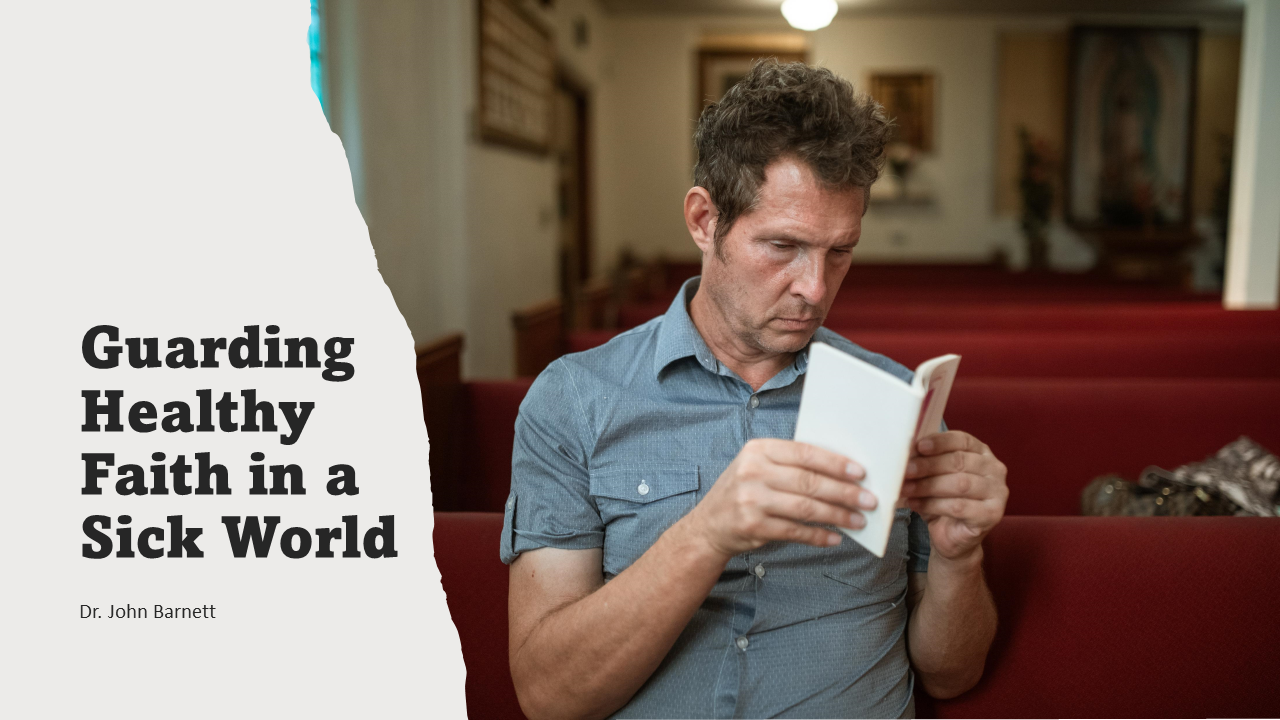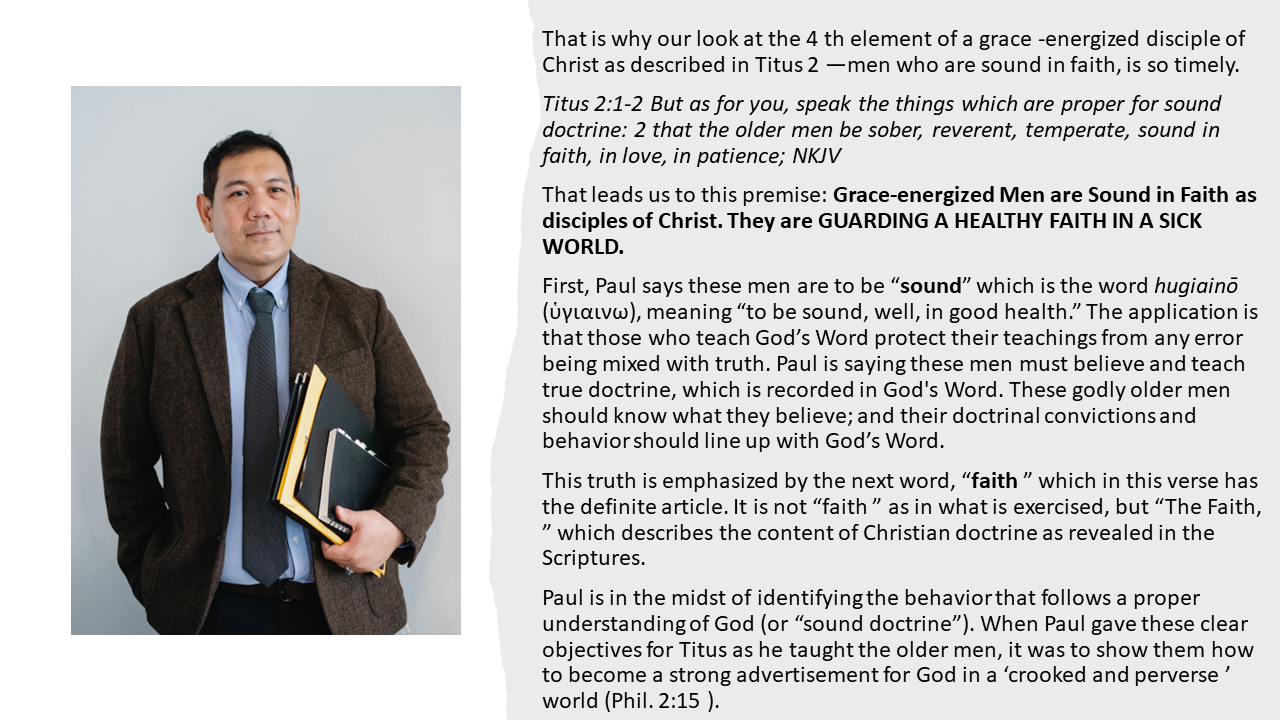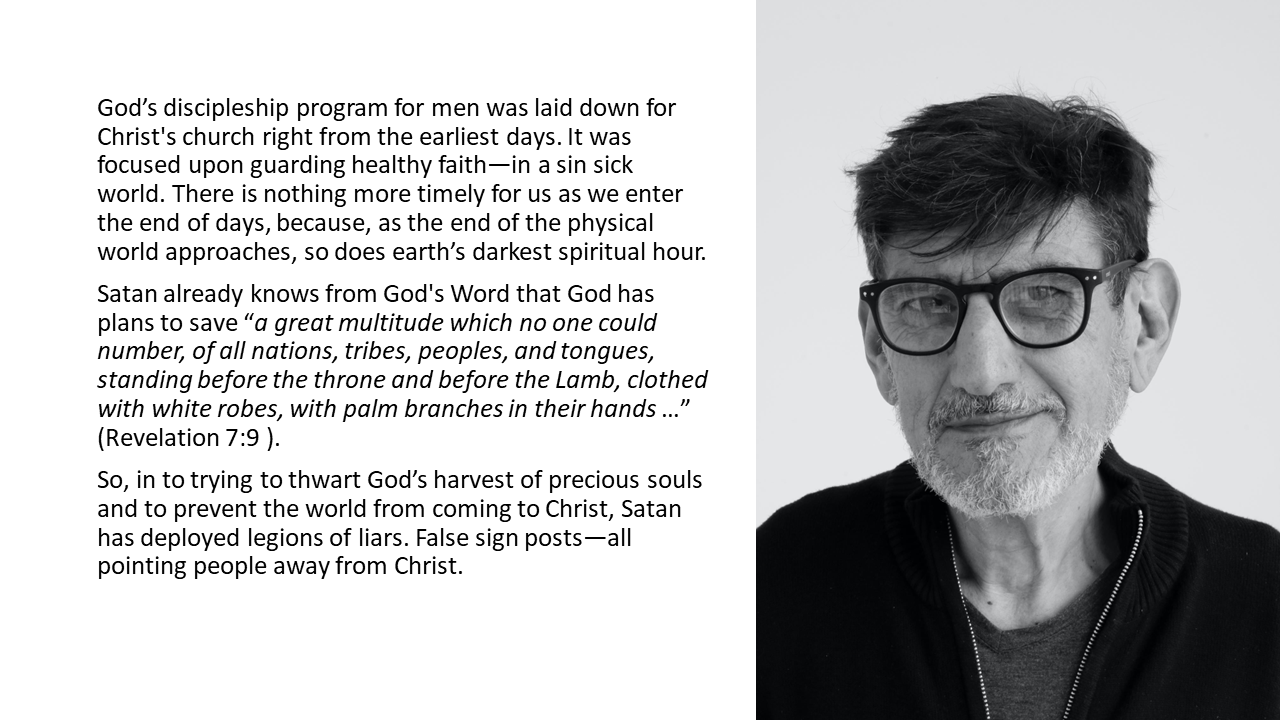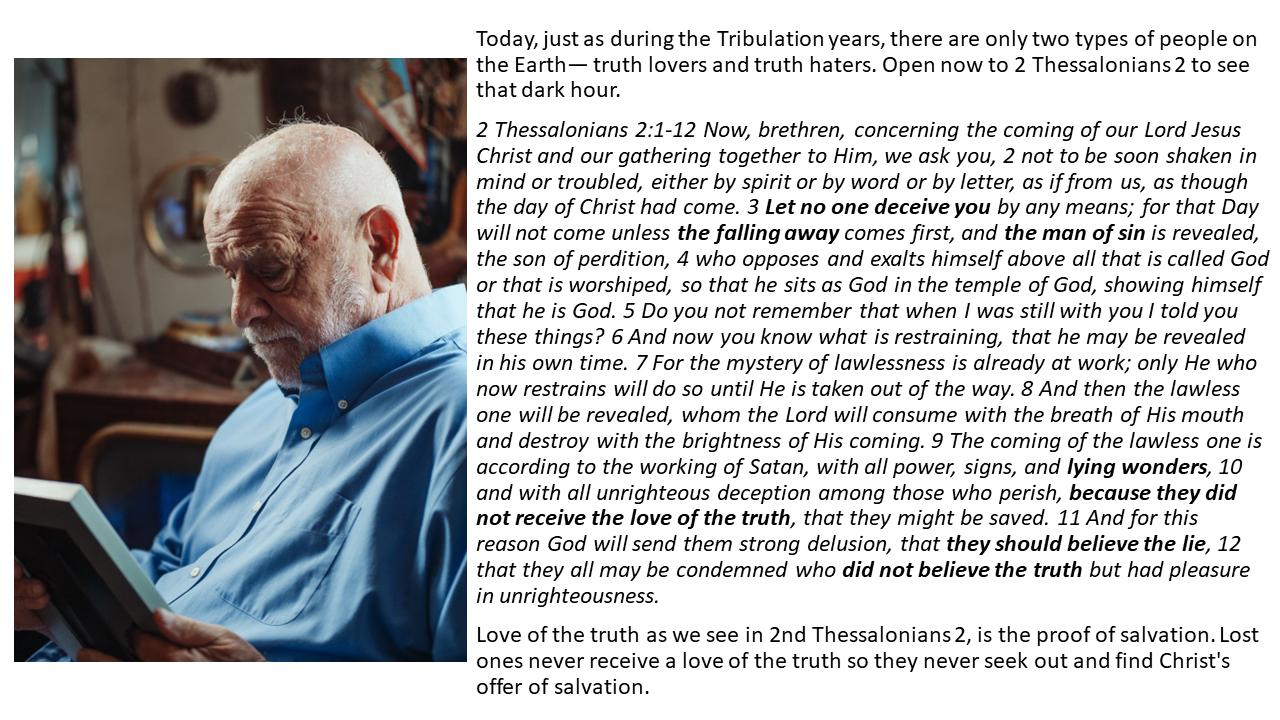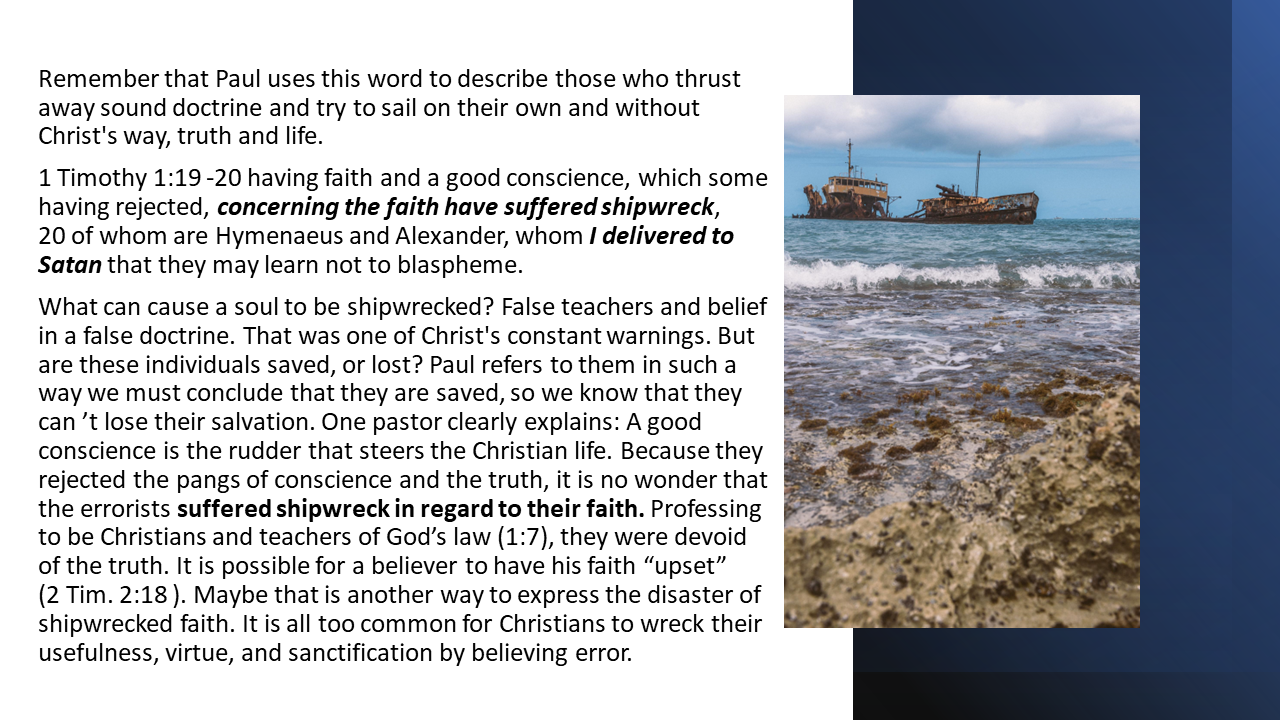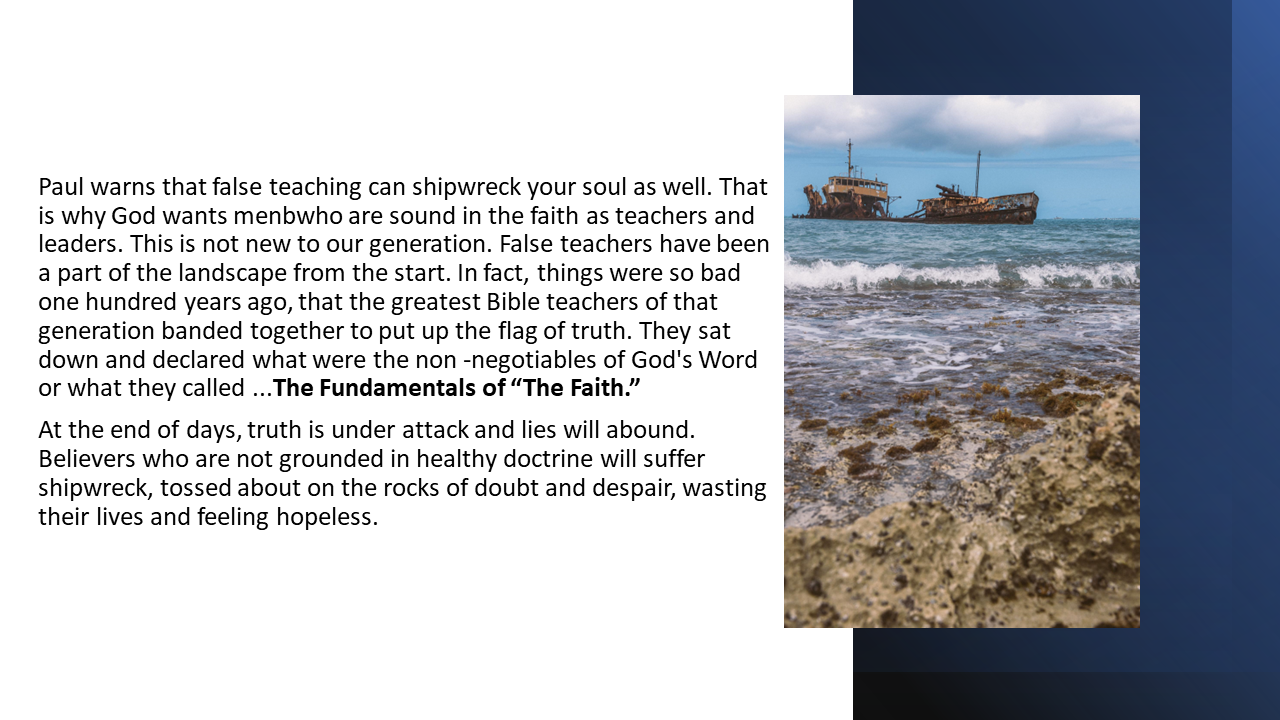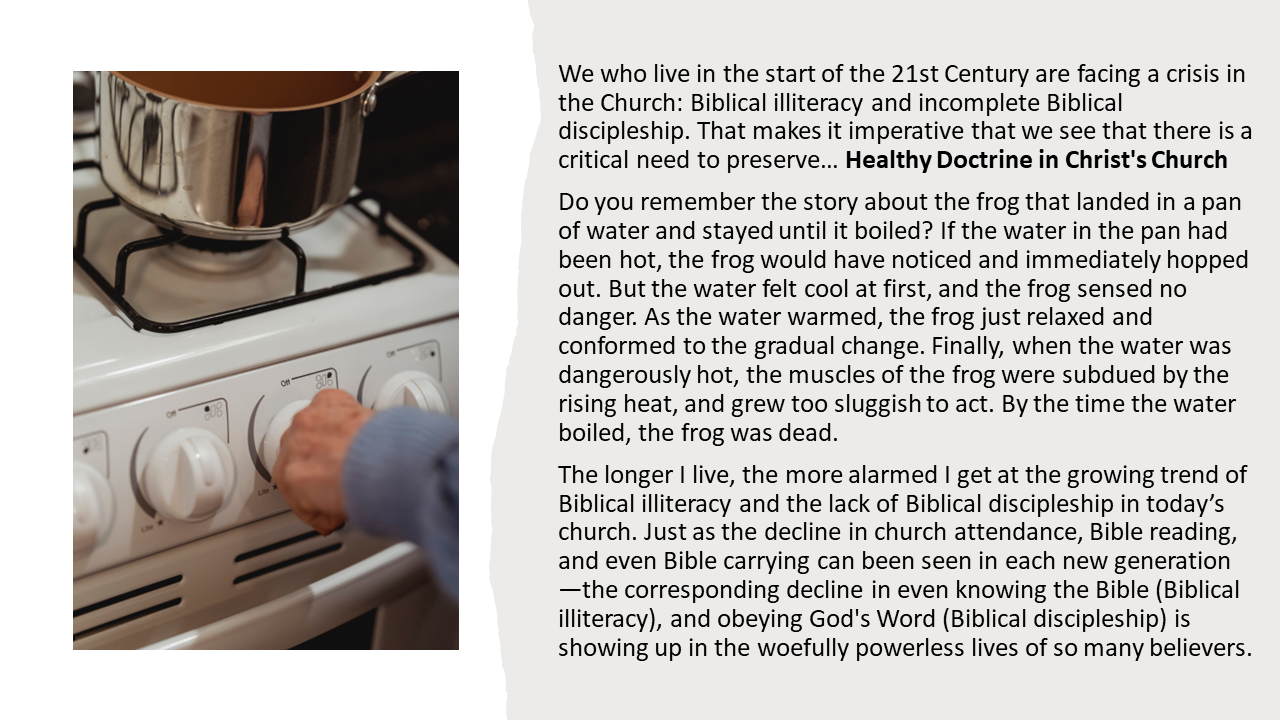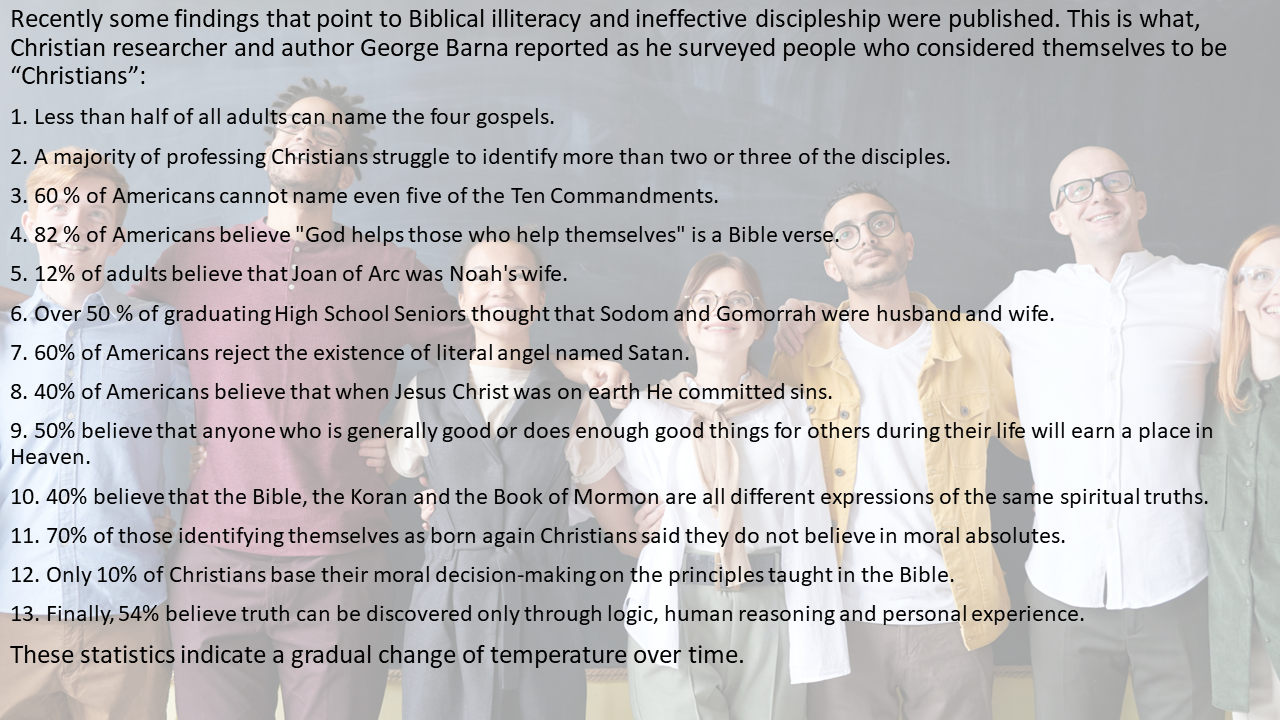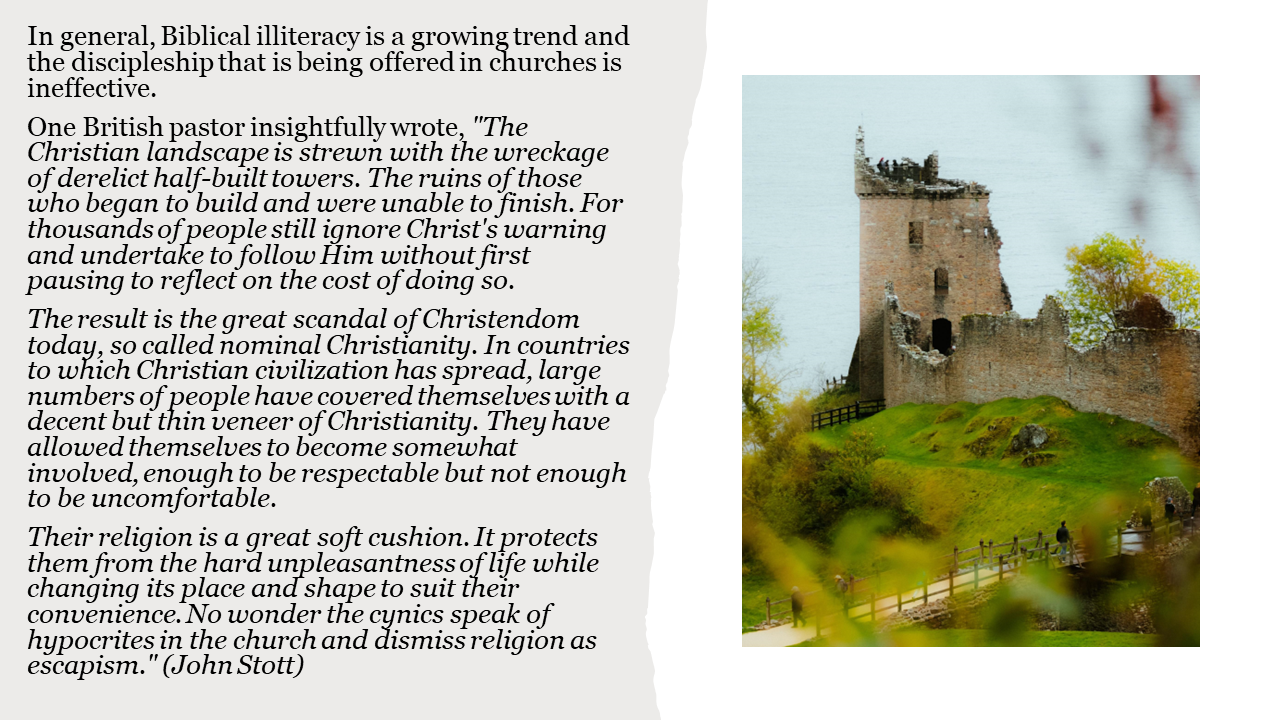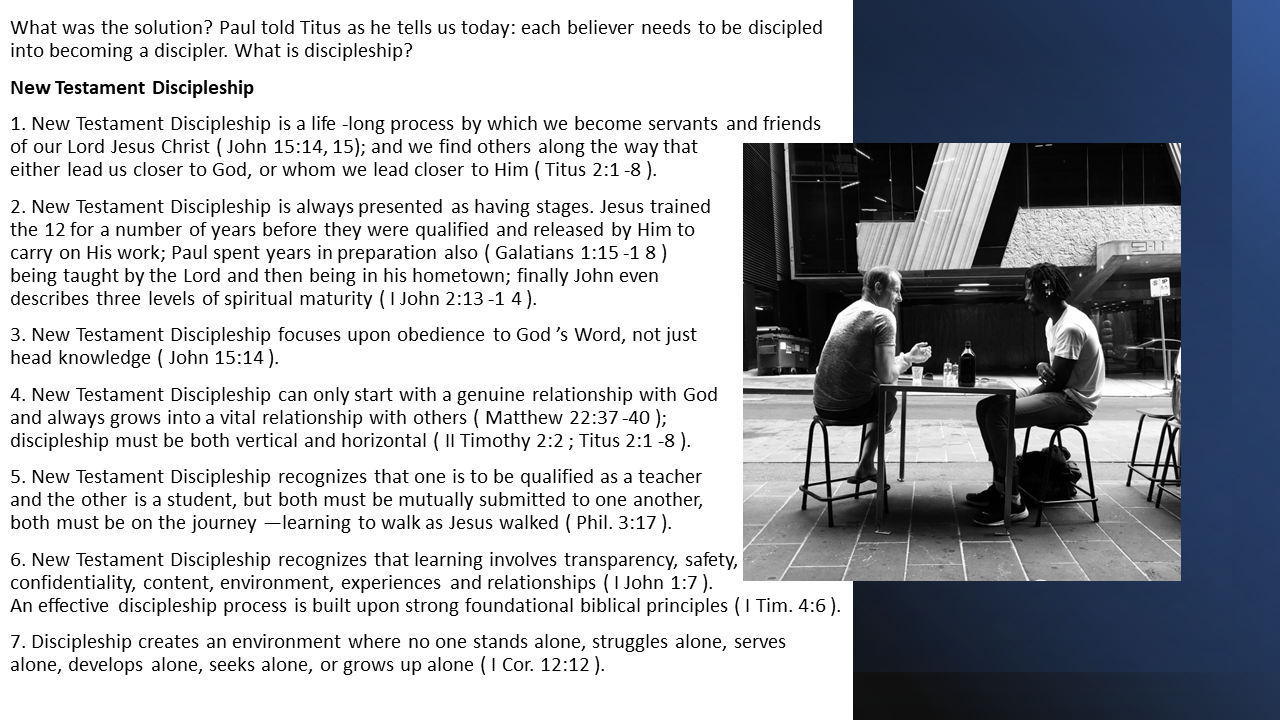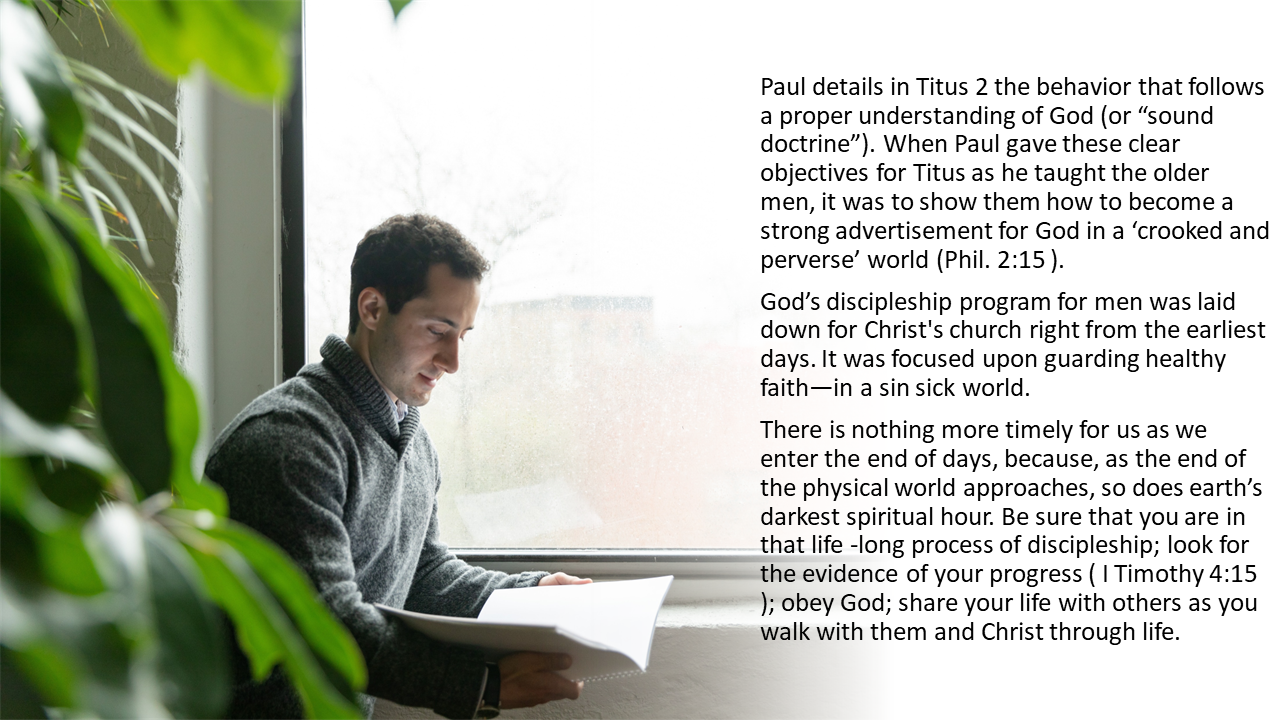GEM-10
080113AM
Nothing is so precious as the faith we have in God, His Word, and Christ’s work for us. That is why Paul sat to write the young church planting pastor named Titus, serving on the island of Crete. Paul’s world was hostile to the truth of God; and Paul warned that days to come would increasingly be filled with false teachings about God, and false doctrines.
II Timothy 4:3-4 For the time will come when they will not endure sound doctrine; but after their own lusts shall they heap to themselves teachers, having itching ears; 4And they shall turn away theirears from the truth, and shall be turned unto fables.
Paul stressed a growing wave of spiritual deception, false doctrines, and strong delusion that surrounded false teachers. Paul continued this theme and even went so far as to warn the elders at Ephesus that the wolves were at the doors and soon would be attacking the church as soon as Paul left (Acts 20). He warned Timothy and all pastors after him (II Timothy 1:14), to guard the teaching of truth, and even described the false doctrines that were taught as deadly and destructive as cancer or gangrene (II Timothy 2:16-18).
Jesus had also warned of the faith of believers being assaulted by these waves of false teaching and teachers (Matthew 24). Jude and Peter repeated this theme and point out inroads that false teaching and teachers had made already in Christ’s church. Then at the end of the New Testament era, John writes that the false teachers were teaching (I, II John), and their teachings had deeply impacted the local churches as Christ’s letters in Rev. 2-3 point out. For all of these reasons Paul writes, Christ’s church is to be filled with…
Men Sound in “The” Faith
That is why our look at the 4th element of a grace-energized disciple of Christ as described in Titus 2—men who are sound in faith, is so timely.
Titus 2:1-2 But as for you, speak the things which are proper for sound doctrine: 2 that the older men be sober, reverent, temperate, sound in faith, in love, in patience; NKJV
That leads us to this premise: Grace-energized Men are Sound in Faith as disciples of Christ. They are GUARDING A HEALTHY FAITH IN A SICK WORLD.
First, Paul says these men are to be “sound[1][1]” which is the word hugiain, meaning “to be sound, well, in good health.” The application is that those who teach God’s Word protect their teachings from any error being mixed with truth. Paul is saying these men must believe and teach true doctrine, which is recorded in God’s Word. These godly older men should know what they believe; and their doctrinal convictions and behavior should line up with God’s Word.
This truth is emphasized by the next word, “faith” which in this verse has the definite article. It is not “faith” as in what is exercised, but “The Faith,” which describes the content of Christian doctrine as revealed in the Scriptures.
Paul is in the midst of identifying the behavior that follows a proper understanding of God (or “sound doctrine”). When Paul gave these clear objectives for Titus as he taught the older men, it was to show them how to become a strong advertisement for God in a ‘crooked and perverse’ world (Phil. 2:15).
God’s discipleship program for men was laid down for Christ’s church right from the earliest days. It was focused upon guarding healthy faith—in a sin sick world. There is nothing more timely for us as we enter the end of days, because, as the end of the physical world approaches, so does earth’s darkest spiritual hour[2][2].
Satan already knows from God’s Word that God has plans to save “a great multitude which no one could number, of all nations, tribes, peoples, and tongues, standing before the throne and before the Lamb, clothed with white robes, with palm branches in their hands…” (Revelation 7:9).
So, in to trying to thwart God’s harvest of precious souls and to prevent the world from coming to Christ, Satan has deployed legions of liars. False sign posts—all pointing people away from Christ.
Falling Away from “The” Faith
Today, just as during the Tribulation years, there are only two types of people on the Earth—truth lovers and truth haters. Open now to 2 Thessalonians 2 to see that dark hour.
2 Thessalonians 2:1-12 Now, brethren, concerning the coming of our Lord Jesus Christ and our gathering together to Him, we ask you, 2 not to be soon shaken in mind or troubled, either by spirit or by word or by letter, as if from us, as though the day of Christ had come. 3 Let no one deceive you by any means; for that Day will not come unless the falling away comes first, and the man of sin is revealed, the son of perdition, 4 who opposes and exalts himself above all that is called God or that is worshiped, so that he sits as God in the temple of God, showing himself that he is God. 5 Do you not remember that when I was still with you I told you these things? 6 And now you know what is restraining, that he may be revealed in his own time. 7 For the mystery of lawlessness is already at work; only He who now restrains will do so until He is taken out of the way. 8 And then the lawless one will be revealed, whom the Lord will consume with the breath of His mouth and destroy with the brightness of His coming. 9 The coming of the lawless one is according to the working of Satan, with all power, signs, and lying wonders, 10 and with all unrighteous deception among those who perish, because they did not receive the love of the truth, that they might be saved. 11 And for this reason God will send them strong delusion, that they should believe the lie, 12 that they all may be condemned who did not believe the truth but had pleasure in unrighteousness.
Love of the truth as we see in 2nd Thessalonians 2, is the proof of salvation. Lost ones never receive a love of the truth so they never seek out and find Christ’s offer of salvation.
Beware of Shipwrecked Faith
Remember that Paul uses this word to describe those who thrust away sound doctrine and try to sail on their own and without Christ’s way, truth and life.
1 Timothy 1:19-20 having faith and a good conscience, which some having rejected, concerning the faith have suffered shipwreck, 20 of whom are Hymenaeus and Alexander, whom I delivered to Satan that they may learn not to blaspheme.
What can cause a soul to be shipwrecked? False teachers and belief in a false doctrine. That was one of Christ’s constant warnings. But are these individuals saved, or lost? Paul refers to them in such a way we must conclude that they are saved, so we know that they can’t lose their salvation. One pastor clearly explains:
A good conscience is the rudder that steers the Christian life. Because they rejected the pangs of conscience and the truth, it is no wonder that the errorists suffered shipwreck in regard to their faith.Professing to be Christians and teachers of God’s law (1:7), they were devoid of the truth. It is possible for a believer to have his faith “upset” (2 Tim. 2:18). Maybe that is another way to express the disaster of shipwrecked faith. It is all too common for Christians to wreck their usefulness, virtue, and sanctification by believing error.[3][3]
Paul warns that false teaching can shipwreck your soul as well. That is why God wants men who are sound in the faith as teachers and leaders.
This is not new to our generation. False teachers have been a part of the landscape from the start. In fact, things were so bad one hundred years ago, that the greatest Bible teachers of that generation banded together to put up the flag of truth. They sat down and declared what were the non-negotiables of God’s Word or what they called …
The Fundamentals of “The Faith”
At the end of days, truth is under attack and lies will abound. Believers who are not grounded in healthy doctrine will suffer shipwreck, tossed about on the rocks of doubt and despair, wasting their lives and feeling hopeless.
That is why Jesus said watch out for false teachers and counterfeit religion. When faced with a similar situation at the turn of the century, evangelicals produced a work called the FUNDAMENTALS in 1909-1915. The writers read like a Who’s Who of Christianity of the day: R.A. Torrey [of Biola], B.B. Warfield [of Westminster Seminary], J.C. Ryle [devotional writer], G. Campbell Morgan [an expositor pastor], C.I. Scofield [of the study Bible], James M. Gray [MBI], A.T. Pierson [devotional writer]and so on.
These men distilled down the fundamental beliefs that distinguish a true believer from a false or counterfeit one. They boiled down all theology into seven essentials. They then presented and explained these seven doctrines in a multi-volume set of books called “The Fundamentals”. Here is a summary of their work into seven essentials that if not guarded can lead one towards shipwreck.
- INSPIRATION: The Inspiration and Reliable Historicity of the Bible.
- CREATION: The error of Evolutionism and Darwinism.
- DOCTRINE: The naming of the cults errors [Jehovah Witness, Mormonism, Christian Science, Spiritism, etc.].
- DEPRAVITY: The reality of sin.
- SUBSTITUTION: Biblical salvation by faith through the grace of God.
- IMPUTATION: The errors of Roman Catholicism.
- CHRISTOLOGY: The Deity, the substitutionary, vicarious death Christ on the cross, His resurrection, and the personal visible Return of Christ.
We who live in the start of the 21st Century are facing a crisis in the Church: Biblical illiteracy and incomplete Biblical discipleship.[4][4] That makes it imperative that we see that there is a critical need to preserve…
Healthy Doctrine in Christ’s Church
Do you remember the story about the frog that landed in a pan of water and stayed until it boiled? If the water in the pan had been hot, the frog would have noticed and immediately hopped out. But the water felt cool at first, and the frog sensed no danger. As the water warmed, the frog just relaxed and conformed to the gradual change. Finally, when the water was dangerously hot, the muscles of the frog were subdued by the rising heat, and grew too sluggish to act. By the time the water boiled, the frog was dead.
The longer I live, the more alarmed I get at the growing trend of Biblical illiteracy and the lack of Biblical discipleship in today’s church. Just as the decline in church attendance, Bible reading, and even Bible carrying can been seen in each new generation—the corresponding decline in even knowing the Bible (Biblical illiteracy), and obeying God’s Word (Biblical discipleship) is showing up in the woefully powerless lives of so many believers.
Recently some findings that point to Biblical illiteracy and ineffective discipleship were published. This is what, Christian researcher and author George Barna reported as he surveyed people who considered themselves to be “Christians”:
- Less than half of all adults can name the four gospels.
- A majority of professing Christians struggle to identify more than two or three of the disciples.
- 60 % of Americans cannot name even five of the Ten Commandments.
- 82 % of Americans believe “God helps those who help themselves” is a Bible verse.
- 12% of adults believe that Joan of Arc was Noah’s wife.
- Over 50 % of graduating High School Seniors thought that Sodomand Gomorrah were husband and wife.
- 60% of Americans reject the existence of literal angel named Satan.
- 40% of Americans believe that when Jesus Christ was on earth He committed sins.
- 50% believe that anyone who is generally good or does enough good things for others during their life will earn a place in Heaven.
- 40% believe that the Bible, the Koran and the Book of Mormon are all different expressions of the same spiritual truths.
- 70% of those identifying themselves as born again Christians said they do not believe in moral absolutes.
- Only 10% of Christians base their moral decision-making on the principles taught in the Bible.
- Finally, 54% believe truth can be discovered only through logic, human reasoning and personal experience.
These statistics indicate a gradual change of temperature over time. In general, Biblical illiteracy is a growing trend and the discipleship that is being offered in churches is ineffective.
One British pastor insightfully wrote, “The Christian landscape is strewn with the wreckage of derelict half-built towers. The ruins of those who began to build and were unable to finish. For thousands of people still ignore Christ’s warning and undertake to follow Him without first pausing to reflect on the cost of doing so.
The result is the great scandal of Christendom today, so called nominal Christianity. In countries to which Christian civilization has spread, large numbers of people have covered themselves with a decent but thin veneer of Christianity. They have allowed themselves to become somewhat involved, enough to be respectable but not enough to be uncomfortable.
Their religion is a great soft cushion. It protects them from the hard unpleasantness of life while changing its place and shape to suit their convenience. No wonder the cynics speak of hypocrites in the church and dismiss religion as escapism.” (John Stott)
What was the solution? Paul told Titus as he tells us today: each believer needs to be discipled into becoming a discipler. What is discipleship?
New Testament Discipleship
- New Testament Discipleship is a life-long process by which we become servants and friends of our Lord Jesus Christ (John 15:14,15); and we find others along the way that either lead us closer to God, or whom we lead closer to Him (Titus 2:1-8).
- New Testament Discipleship is always presented as having stages. Jesus trained the 12 for a number of years before they were qualified and released by Him to carry on His work; Paul spent years in preparation also (Galatians 1:15-18) being taught by the Lord and then being in his hometown; finally John even describes three levels of spiritual maturity (I John 2:13-14).
- New Testament Discipleship focuses upon obedience to God’s Word, not just head knowledge (John 15:14).
- New Testament Discipleship can only start with a genuine relationship with God and always grows into a vital relationship with others (Matthew 22:37-40); discipleship must be both vertical and horizontal (II Timothy 2:2; Titus 2:1-8).
- New Testament Discipleship recognizes that one is to be qualified as a teacher and the other is a student, but both must be mutually submitted to one another, both must be on the journey—learning to walk as Jesus walked (Phil. 3:17).
- New Testament Discipleship recognizes that learning involves transparency, safety, confidentiality, content, environment, experiences and relationships (I John 1:7). An effective discipleship process is built upon strong foundational biblical principles (I Tim. 4:6).
- Discipleship creates an environment where no one stands alone, struggles alone, serves alone, develops alone, seeks alone, or grows up alone (I Cor. 12:12).
Paul details in Titus 2 the behavior that follows a proper understanding of God (or “sound doctrine”). When Paul gave these clear objectives for Titus as he taught the older men, it was to show them how to become a strong advertisement for God in a ‘crooked and perverse’ world (Phil. 2:15).
God’s discipleship program for men was laid down for Christ’s church right from the earliest days. It was focused upon guarding healthy faith—in a sin sick world.
There is nothing more timely for us as we enter the end of days, because, as the end of the physical world approaches, so does earth’s darkest spiritual hour. Be sure that you are in that life-long process of discipleship; look for the evidence of your progress (I Timothy 4:15); obey God; share your life with others as you walk with them and Christ through life.
Disciples of Christ Can Spot a False Teacher
These men were making a “most wanted” poster for believers—showing who the enemy was of the truth. So how do we spot these false teachers? What do these signposts pointing people in the wrong direction believe and teach? What is the message promoted by Satan’s legion of liars?
Often it is not what they say—but what they don’t say that identifies them! What do false teachers deny? How do you spot a false teacher? There are clear signs of an apostate or false teacher:
- THEY DENY CHRIST IS THE ONLY WAY. 1 Timothy 4:1 Now the Spirit expressly says that in latter times some will depart from the faith, giving heed to deceiving spirits and doctrines of demons,
- THEY DENY OUR LIBERTY IN CHRIST. 1 Timothy 4:3 forbidding to marry, and commanding to abstain from foods which God created to be received with thanksgiving by those who believe and know the truth.
- THEY DENY DIVINE POWER. 2 Timothy 3:4-5 traitors, headstrong, haughty, lovers of pleasure rather than lovers of God, 5 having a form of godliness but denying its power. And from such people turn away!
- THEY DENY BIBLICAL TRUTH. 2 Timothy 3:8 Now as Jannes and Jambres resisted Moses, so do these also resist the truth: men of corrupt minds, disapproved concerning the faith;
- THEY DENY THE NECESSITY OF SOUND DOCTRINE. 2 Timothy 4:3-4 For the time will come when they will not endure sound doctrine, but according to their own desires, because they have itching ears, they will heap up for themselves teachers; 4 and they will turn their ears away from the truth, and be turned aside to fables.
- THEY DENY THE DEITY OF CHRIST. 2 Peter 2:1 But there were also false prophets among the people, just as there will be false teachers among you. They will secretly introduce destructive heresies,even denying the sovereign Lord who bought them — bringing swift destruction on themselves. (NIV)
- THEY DENY THE REALITY OF CHRIST COMING AGAIN. 2 Peter 3:3-4 knowing this first: that scoffers will come in the last days, walking according to their own lusts, 4 and saying, “Where is the promise of His coming? For since the fathers fell asleep, all things continue as they were from the beginning of creation.”
- THEY DENY THE NECESSITY OF PERSONAL HOLINESS. Jude 18 how they told you that there would be mockers in the last time who would walk according to their own ungodly lusts.
- THEY DENY THE NECESSITY OF THE HOLY SPIRIT. Jude 19 These are sensual persons, who cause divisions, not having the Spirit.
Another element of Barna’s report states, “Christians have increasingly been adopting spiritual views that come from Islam, Wicca, secular humanism, the eastern religions and other sources. Because we remain a largely Bible-illiterate society, few are alarmed or even aware of the slide toward syncretism – a belief system that blindly combines beliefs from many different faith perspectives.”
Syncretism is Deadly
This direction of syncretism was seen in the Old Testament as the people ofIsrael were commingled with pagan they mixed parts of the truth of the Bible with false worship of paganism and came out with a blend that disgusted God. Diluting God’s Word and adding error is dangerous and to be avoided at all costs.
Two passages clearly show us this syncretistic pattern in the Old Testament.
There has always been the same struggle within the church. A hundred years ago it was seen in what was called liberalism, today it is seen in what is called the emergent church. Both were syncretistic, both end of denying the truth by mixing it with error. The three biggest dangers of the EC are:
Danger #1: The Cross
A first area of concern with the ECM is the cross. Here we ask questions like “What is the meaning of the atonement”? And “Did Jesus actually pay for or purchase anything on the cross?”
Matthew 20:28? “…just as the Son of Man did not come to be served, but to serve, and to give His life a ransom for many.” Jesus knew why he had to die; and we cannot read the New Testament and conclude otherwise.
But some ECM writers teach that the cross simply serves as a profound demonstration of the love of God. On the cross, Christ “absorbed all the pain, all the suffering caused by the breakdown in our relationship with God and in doing so demonstrated the lengths to which a God who is love will go to restore it.” (Chalke)
The doctrine of penal substitution–the understanding that, on the cross, Christ died in our place, bearing the penalty for our sin—is thus rejected.
One of the most visible leaders and ECM writers says, “The Christian faith should become a welcome friend to other religions of the world, and not a threat.” He goes on to write that not all people need to be Christians to follow Jesus. Some may be able to be “Buddhist or Hindu followers of Jesus.” (Brian McLaren)
But a true disciple of Jesus Christ who knows God’s Word sees the reality of sin, and the necessity of personal salvation, and doesn’t lose the simplicity of the gospel which is in Christ; and all that is rooted in a proper, high view of Holy Scripture. When the Bible is lost, and when sin and salvation through Christ is no longer important, that there becomes a loss of witness, a loss of conviction—and a shipwrecked faith.
Danger #2: The Authority of the Bible
ECM error centers upon a rejection of the absolute authority of the Bible. Here we ask questions like “Is the Bible inerrant?” And “In what sense the Bible is God’s communication to us?”
Examples of this total loss of holding onto God’s Word as authoritative can be seen in some of the ECM’s leaders irreverence which includes referring to God as a chick, and as a Cosmic Child Abuser (describing the crucifixion of the Son at the Father’s will). The negation of the authority of God’s Word causes ECM writers to question God’s sovereignty over and knowledge of the future, as well as a denial of the substitutionary atonement at the cross, a denial of the sin of homosexuality, and a denial of hell.
Danger #3: The Nature of Truth
A third concern with the ECM is concerning the very nature of truth. Here we ask questions like “What is truth?” and “Does Christianity give us an accurate picture of the way the world really is, and can we know it?”
Carson explains that the fundamental issue is epistemology–i.e., how we know things or think we know things. EC leaders say that we can’t be dogmatic, authoritative, or even sure about doctrines that have always been believed by evangelicals throughout all of Church History.
Should We Reject Everything Coming Out of the ECM?
Our answer is a resounding no. Indeed, we should share their dissatisfaction with certain abuses or deficiencies within Evangelicalism. We should resonate with their criticisms of consumerism, their emphasis on an authentic lived-out faith, a move toward decentralized leadership within the church, and with what many consider the heartbeat of the movement, their passion to be missional.
“The church should stop mimicking the surrounding culture and become an alternative community, with a different set of beliefs, values and behaviors.
Ministers would no longer engage in marketing; churches would no longer place primary emphasis on programs to serve members.
The traditional ways of evaluating ‘successful churches’ – bigger buildings, more people, bigger budgets, larger ministerial staff, new and more programs to serve members – would be rejected.
New yardsticks would be the norm: To what extent is our church a ‘sent’ community in which each believer is reaching out to his community?
To what extent is our church impacting the community with a Christian message that challenges the values of our secular society?”[5][5]
One writer describes the missional church “as a body of people sent on a mission who gather in community for worship, encouragement, and teaching from the Word that supplements what they are feeding themselves throughout the week.”[6][6]
Detached from Truth—People Shipwreck
So how do we stay safe as these dark days cast their shadow across society, media, culture, and every other realm of daily life? Only one way—check the anchor of your soul.
When the world darkens, culture crumbles, and truth dies—you know the end of the world is near.
It is then that Jesus warned that the church would fill up with fruitless counterfeits.
When that happens it is time for believers to brace for the storm that we know is coming. The waves will only increase. Spiritual darkness will only deepen as deceptions grow.
These are days when we who know and love the Lord Jesus should reach into our hearts and grab onto our anchor line and feel it strongly holding us securely—tugging us homeward.
Jesus is Our Anchor
Hebrews 6:11-12, 18-20 And we desire that each one of you show the same diligence to the full assurance (plerophoreo – to overflowingly wear or hold or possess or have) of hope until the end, 12 that you do not become sluggish, but imitate those who through faith and patience inherit the promises. 18 that by two immutable things, in which it is impossible for God to lie, we might have strong consolation, who have fled for refuge to lay hold of the hope set before us. 19 This hope we have as an anchor of the soul, both sure and steadfast, and which enters the Presence behind the veil, 20 where the forerunner has entered for us, even Jesus, having become High Priest forever according to the order of Melchizedek. NKJV
[1][1] Sound translates a participle form of the verb hugiainō, which has the basic meaning of “being well and healthy” and is the term from which we derive “hygiene.” Paul uses a form of this word nine times in the pastoral epistles, five of those times in Titus, and always in relation to personal righteousness and spiritual well-being. He repeatedly emphasizes that sound doctrine (1 Tim. 1:10; 2 Tim. 4:3; Titus 1:9; 2:1) eventuates in sound faith and sound speaking (1 Tim. 6:3; 2 Tim. 1:13; Titus 1:13; 2:2, 8). Healthy doctrine produces healthy spiritual living. (MacArthur, John: Titus. Chicago : Moody Press, 1996, S. 90)
[2][2] 050612AM WNS-21.
[3][3]MacArthur, John F., The MacArthur New Testament Commentary, (Chicago: Moody Press) 1983.
[4][4] COREnet: a newsletter from CORE Discipleship Ministry
[5][5] In an article titled, “The ‘Missional Church’: A Model for Canadian Churches?” David Horrox writes,
[6][6] Dan Kimball in “The Emerging Church” (Zondervan, 2003).

